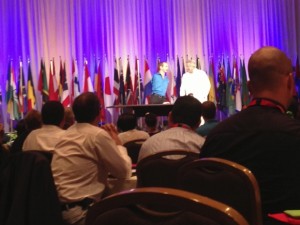Why Nick Vujicic’s got nothing on you
Are you ever tempted to think this?
Easy for him! Of course a guy with no limbs can get and keep an audience’s attention. He’s got a story to tell! What I speak/teach about is unoriginal! Or just plain boring.
You’d be wrong to think Nick has an advantage
Work with me here. In life many people would be tempted to think of being born without limbs as a disadvantage. Flip that around, though. Nick’s an inspiring speaker who teaches, and if you were to teach on the same topics as he does, you’d start to feel like you are the one whose story doesn’t have that “ooooo” factor. (If you don’t know Nick’s story, watch a few minutes this.)
A few weeks ago I had the chance to sit very near the stage and listen to Nick for an hour. Like most of you, I find Nick’s story a serious don’t-give-up inspiration. I really love this guy, but…
Nick teaches stuff that isn’t that original
Nick’s story, situation and expression are original, for sure. But he talks about timeless things such as hope and success and attitude and working hard. He’s a bona fide pro at it. But so are many, many other speakers, and here’s the rub:
You probably speak and teach on topics that aren’t totally your own. It might be leadership or sales. You might be teaching contractors about the legal language on the ladders your company sells. You might be finding a new twist on an old theme or just teaching the organization’s content.
It doesn’t matter. It can be a well-worn topic or something that’s boring as heck.
Telling one’s own story is one means to the goal, but it’s not the goal
It’s easy to fall into the trap that a story has to be told like a motivational or inspirational speaker. Not true.
In fact, Nick is successful not because he’s mastered telling his own story (he has!), but because he’s mastered doing what you have to master: Helping your audience own their story in the lesson.
Ideas and change aren’t going to be sticky until the learner “owns it”
A rare few speakers get to just tell a entertaining or heartrending stories. The vast majority have to create connections that help others contribute to a mission. Most live by a maxim:
You, the speaker/teacher/coach, are not the hero of the story. Your audience is.
This probably looks like helping them “own” something like this:
“I can learn this, I can master this, I can do this. When I do, I’ll make my quota, I’ll feel good about myself, I’ll keep my job, I’ll get the promotion, I’ll be part of contributing to the success of the organization, I’ll…”
And you don’t have to be a motivational speaker to do that.
There are many ways to help learners “own it”
Think about what a coach or facilitator does. The good ones ask questions. Some great ones do nothing but ask questions. Why? They’re drawing out the story of the person or audience in front of them. Remember, the origin of the word “educate” means “to draw or lead out.”
You’re the connector: Find your way
I don’t know your story, your skills, or your relative level of experience speaking, teaching, or coaching. But I am crazy enough to believe something about you anyway:
You can persist when you have hope. You can find a way, your way, of connecting with the audience in front of you. You can master helping others master something that helps them own it, grow it, and share it, whatever “it” is.
Nick found his way. Go get busy refining yours.
Footnote: You should buy Nick’s stuff or support his charitable work. Really.

